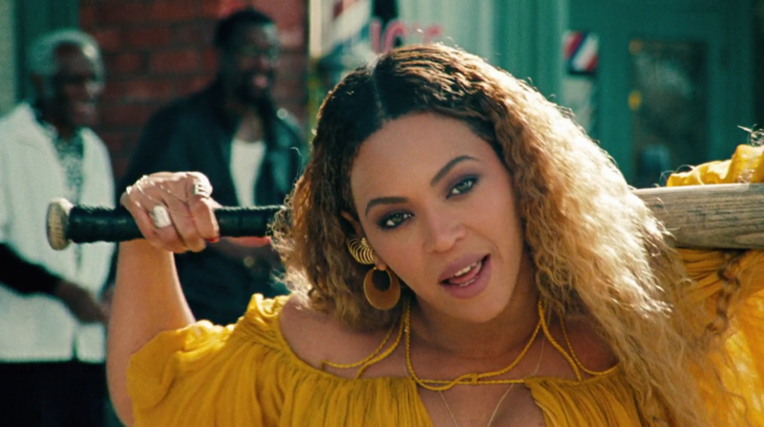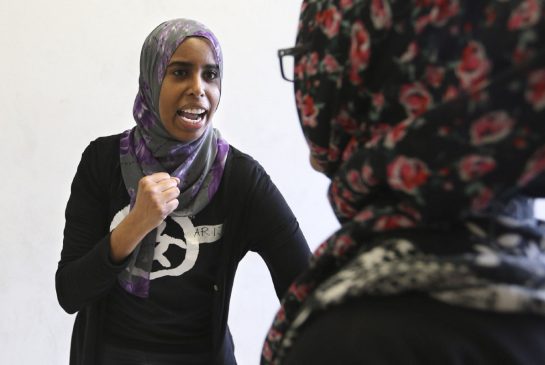I tried to make a home out of you but doors lead to trap doors, a stairway leads to nothing. Unknown women wander the hallways at night. Where do you go when you go quiet?
I finally watched Beyonce’s latest work, Lemonade, a staggering and vivid “visual album”, and was stunned. The album is a deeply personal narrative of individual female rage, suffering, survival and redemption. The visual production is painful, raw, real, audacious, and hopeful. The images and colors bring emotion to life in a way that only a deeply feminine catharsis could.
Within a few minutes, I recognized a wave of all too familiar physical reactions, I felt my jaw clenching from remembrance of past traumas; something about the experience – the sounds, the colors, the words, the dreamlike atmosphere – captured a series of emotions that I’ve been closely guarding for some time now.
These were my unreleased, closely drawn truths too. This is what being a woman, my life, and the destruction of my first marriage brought to me as well.
Following the release of Beyonce’s recent single, ‘Formation’, an anthem exploring race, Black feminism, suffering, and power in America, Lemonade takes a dive into many of these same intersecting themes. (In fact, ‘Formation’ plays after the credits of this visual album.) Here though, Beyonce brings us to a generational and societal narrative not by portraying collective experiences, but through a vaguely autobiographical detour inside the story of one woman.
With collaborators including British-Somali poet Warsan Shire, Beyonce plunges head first into the kind of rawness that can only come from a singular story as she enters the mind of a woman whose marriage has been slashed open, who has been left for dead but will be resurrected. In Lemonade, Beyonce is a woman who isn’t going to be satisfied with the image of ‘him’ lacerating her marriage, the sanctuary she had built with him and in him, being a final chapter. Nor will she let her story be told through rumors, “elevator videos”, and vague references. Instead, she dissects the entire experience – her own life story – herself.
Lemonade begins with a reverberating drumbeat seemingly coming from within and the raw, breath-like singing of a woman who is in control of her breathing because she has to be. This isn’t a woman meditating, but one surviving the wounds of betrayal. The first lyrics are words turned into a prayer that escapes this woman’s breath: “I’m prayin’ I catch you whispering; I’m prayin’ you catch me listening; I’m prayin’’ you catch me…”
Drawing on the Kübler-Ross model’s five stages of grief, Lemonade is divided into 11 chapters or title cards, providing a visual and sonic silence between the phases: “Intuition,” “Denial,” “Anger,” “Apathy,” “Emptiness,” “Accountability,” “Reformation,” “Forgiveness,” “Resurrection,” “Hope,” and “Redemption.” Like a Tarantino film, the title cards isolate the viewer from the environment. The viewers cannot lose themselves in the music or the images alone – there is no continuity to be found here, but sharp edges. Unless you want to meet the same fate as ‘Becky with the good hair’, you better pay close attention.
The chapter title cards and infusion of Warsan Shire’s brilliant spoken word are not just interesting cinematic choices, as viewers and listeners they force us to engage with the content intellectually and name the emotions we are being drawn to. A destructive marriage feels much the same way.
When you are that woman, your life is a series of chapters, noises, bangs, and colors between title cards. When you are that woman you aren’t breathing to meditate, but to survive, to keep from drowning. You are controlling what remains after what you cannot control has taken its share. Someone, something else – maybe even God – is taking you on a ride. You’re supposed to learn something – about yourself, about love and power, about God, about trying again – by the end. Here, Beyonce recreates the experience.
Beyonce’s second track, ‘Hold Up’, a vivid lemon-splashed, aquatic symphony turned into a beautiful rage fest equipped by a baseball bat named Hot Sauce, and her third track, ‘Don’t Hurt Yourself’, a percussion-driven, lyrically masterful, scowl-laden, soulful post-pop exploration, are feminine anger at its most fervent notes. As the album continues, Beyonce explores what a rage-filled denial and isolation look and feel like.
In the second act, Beyonce surprises – the woman we are introduced to is a woman who will survive. Because survive is what we women do. It is what connects us to our mothers and grandmothers. We suffer by our men, while we cry to protect them too. The men we love betray us, while the world kills our sons.
Beyonce shows the ones who don’t know it yet and reminds those of us who have walked this road of what we already know – after all the anger and isolation, there is redemption to be found, there is still love and beauty to be found because it lies within us.
If you haven’t seen Lemonade yet or read its many reviews, you should. These are heady and exhilarating reviews with thoughtful analysis, entire round tables of brilliant Black women’s opinions on Beyonce’s musical and visual luminosity, the status of race in 2016 America, the forgotten South, infidelity, intersectional feminism, power, forgiveness, and spirituality, including the spiritual cultures of Black and Indigenous America.
All of this viewing, reading, and listening is exhilarating to witness. Yet, the political is also personal. Beyonce might have made it easier for all of us to weigh in on topics of great social importance, but she also opened the doors to a dazzling, voyeuristic glimpse into what a marriage gone wrong looks like.
For those of us who have experienced and are still surviving the scars of marriages and partnerships gone terribly wrong, Beyonce gives us a sonic, cinematic summary that depicts the broad landscapes of our rawest emotions. Beyonce shows the world what it is like to be a woman humiliated and lied to. She shows what it feels like to be a woman who learns of her husband’s infidelities and his endless crimes, first through unconfirmed whispers and finally through violent, public exposures.
Rage does not capture it alone. Anger does not sufficiently describe what it feels to find out that you are that woman. Vengeance does not describe what she wants. Moving on does not describe what she does. Forgiveness is not a goal in of itself for a woman scorned. Rather, the experience is all of these things, all at once. This woman, the betrayed woman, experiences all of this in exponentially magnified ways – in ways that perhaps only colors, lights, sounds, and the words of a poet can describe.
In Lemonade Beyonce has connected feminine suffering into a broader social narrative. Her depiction is a seldom shared narrative of heartbreak and survival experienced by all too many women, particularly generations of women of color.
This is not music. This is mastered artistry. There is so much raw power in feeling heard. There is so much power in storytelling. Maybe what Beyonce is sharing here is that what we women do is more than survive, we tell stories. We narrate life itself.
I am the dragon breathing fire, Beautiful man I’m the lion, Beautiful man I know you’re lying. I am not broken, I’m not crying, I’m not crying.
Samar Kaukab is an altM columnist and Advisory Board member. You can follow her on Twitter at @samarkaukab.





Women need to start treating themselves better so they can treat each other better, because in this feminine suffering another woman is also part of the cause of it is she not?
It is what artists do , they use their arts to express personal stories,grieves and /or wider issues. Beyonce will definitely connect “feminin into a broader social narrative” when she ll address the degrading images of women depict in video clips ,those video clips which convince some men that women are to be used interchangeably ,are not worth respect and make young girls believe that their bodies are finallly their only tool to be seen and listened to.
Utter nonsense… I am still trying to figure out what this has to do with the religion of Islam.